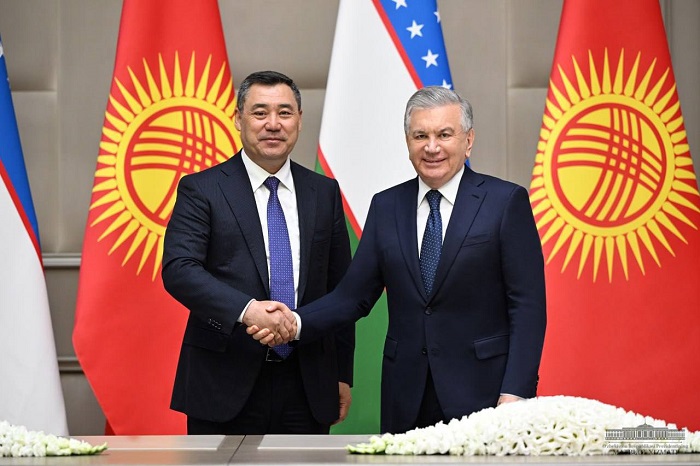On 18 July 2024, President Shavkat Mirziyoyev of Uzbekistan and President Sadyr Japarov of Kyrgyzstan held summit talks in Tashkent.
The main political document of the visit was the Joint Statement on further deepening and expanding the relations of a comprehensive strategic partnership signed by the heads of state.
A key outcome was the establishment of an Interstate Council, led by both presidents, to further solidify cooperation. The leaders committed to fostering a close political dialogue, including active engagement between parliaments, governments, ministries, regional authorities, business communities, and the public.
Mutual support within regional and international organizations remains a cornerstone of the partnership. This includes collaboration within the UN, SCO, CIS, Organization of Turkic States, Consultative Meetings of Heads of State of Central Asia, and other relevant platforms.
In particular, special attention was paid to deepening cooperation in the fields of economy, trade, investment and agriculture.
Thus, the parties aim to double the bilateral trade turnover to $ 2 billion from $ 1 billion of trade reached by the end of 2023.
To achieve this ambitious target, the parties have outlined a comprehensive program. Measures are being implemented to significantly increase the volume of goods exchanged between the two countries.
The establishment of trading houses in the capitals of both nations will facilitate trade and business interactions.
A long-term portfolio of export-import contracts will provide stability and predictability for businesses.
Initiatives will be introduced to support exports, potentially including financing and marketing assistance. Streamlining the recognition of certificates will reduce trade barriers. A “green corridor” will be established to expedite the import and export of fruits, vegetables, and livestock products.
The leaders separately discussed the issues of creating new growth points in industrial cooperation with a focus on complementary sectors. These are projects in the field of energy, automotive, transport and logistics, electrical engineering, textile, agro-industrial and other industries.
On the sidelines of the visit, the heads of state launched important projects online. This is the construction of two solar power plants with a total capacity of 400 megawatts in the Ferghana and Namangan regions. The electricity generated at these stations will be supplied to Kyrgyzstan.
A plant for the production of modern passenger cars and commercial vehicles has been commissioned in the Chui region (Kyrgyzstan). In particular, cars of the “Cobalt”, “Onyx” and “Tracker” brands, as well as trucks, will be produced. The production of sewing and knitting products and canvases has also started in the Kyrgyz city of Kara-Balta.
To support industrial cooperation projects, the parties decided to increase the authorized capital of the Uzbek-Kyrgyz Development Fund to $ 200 million.
Moreover, new opportunities were defined in the field of agriculture, including the joint cultivation of crops, the creation of intensive gardens and agro-clusters, using the tools of futures transactions.
The parties agreed to intensify joint efforts to strengthen transport connectivity in the region. An agreement has been reached on the establishment of an expert group to study new projects in the field of transport corridor development. At the same time, the importance of the early start of practical work on the construction of the China–Kyrgyzstan–Uzbekistan railway, which is of strategic importance for strengthening the transport interconnection of the two countries and the development of the entire region, was noted.
The sides also discussed the pace of cooperation in the energy sector. They agreed to work together on the implementation of projects for the construction of the Kambarata HPP-1, as well as the HPP on the Chatkal River.
Following the summit talks, a package of documents were signed:
– Intergovernmental Agreement on resort and recreational facilities located on the territory of the Issyk-Kul region of the Kyrgyz Republic;
– Protocol on amendments to the intergovernmental Agreement on Mutual Travel of Citizens;
– Protocol on the completion of bilateral negotiations on the accession of the Republic of Uzbekistan to the World Trade Organization;
– Protocol on cooperation in the field of construction activities;
– Protocol on Cooperation in the field of Labor, Employment and Migration;
– Protocol on Cooperation in the field of culture and art;
– Protocol on Cooperation in the field of public service;
– An action plan to increase the mutual trade for 2024-2030;
– A plan of practical measures for the development of cooperation in the field of physical culture and sports for 2024-2026;
– Roadmap for further development of cooperation in the field of agriculture and food security for 2024-2026;
– Action plan for the development of cooperation between the cities of Tashkent and Bishkek for 2024-2026;
– Memorandum between the Institute for Strategic and Interregional Studies under the President of the Republic of Uzbekistan and the National Institute for Strategic Initiatives under the President of the Kyrgyz Republic and others.
***
Uzbek-Kyrgyz Business Forum – 20 deals inked
On July 17, an Uzbek-Kyrgyz business forum was held in Tashkent, following which 20 agreements, memoranda and trade contracts were signed in the fields of food production, construction materials, creation of a logistics center, waste recycling, geological exploration and coal supplies, as well as IT services and supplies of electrical and agricultural products.
It was noted at the forum that cooperation in the field of investment and industrial cooperation has intensified in recent years. Today, about 280 enterprises with the participation of Kyrgyz capital operate in Uzbekistan.
An important role in the implementation of joint initiatives is played by the Uzbek-Kyrgyz Development Fund, whose portfolio includes 33 investment projects worth $ 186 million.
It is planned to increase mutual supplies of goods in such categories as food, textiles, shoes, fertilizers, pharmaceutical products, household appliances, IT services, etc.
The forum also discussed the creation of joint ventures in the border regions for the production of household appliances, medicines, furniture, building materials, shoes, leather goods. ///nCa, 19 July 2024
